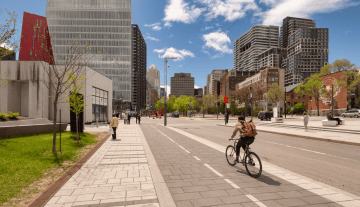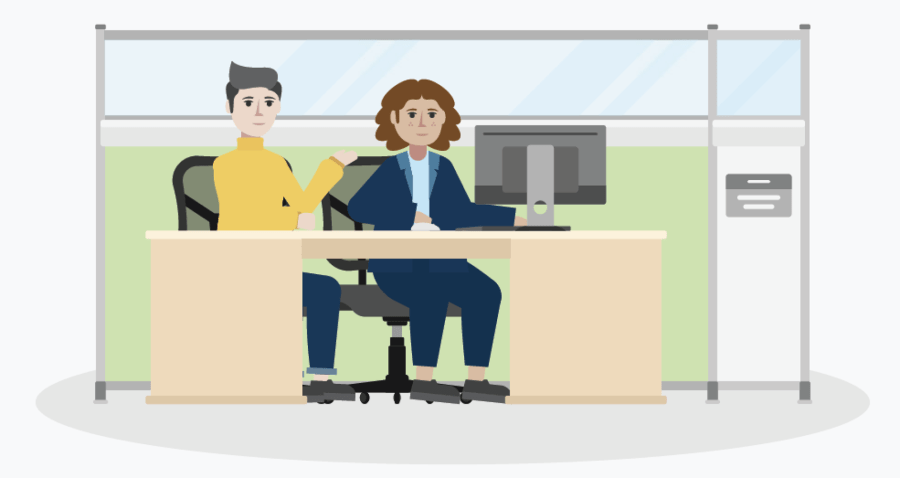Careers for a Sustainable Future
Explore how diverse careers—from trades to technology; connect to clean energy, conservation, and the growing green economy.
- Grades 8-12
- 3 activities
- 3.5 hours

Big idea
Discover how diverse careers contribute to Canada’s growing green economy.
Learning objectives
- Understand how diverse careers contribute to sustainability and the green economy through innovation, conservation, and responsible resource use.
- Investigate the range of skills, education paths, and industries shaping environmentally focused careers and the future workforce.
- Highlight real-world examples of professionals making an impact through energy conservation, technology, and sustainable practices.
Activities

What do you do at work?
Learn what others do in their careers and create a vision board to guide your journey.
BC curriculum fit
Career Education 8 & 9
Big Ideas
- Reflecting on our preferences and skills helps us identify the steps we need to take to achieve our career goals.
- Our career paths reflect the personal, community, and educational choices we make.
Content
- Personal development: self-assessment for career research.
- Community connections: local and global needs and opportunities, and factors affecting types of jobs in the community.
Competencies
- Use self-assessment and reflection to develop awareness of strengths, preferences, and skills.
- Question self and others about how individual purposes and passions can support community needs locally and globally when considering career choices.
- Recognize and explore diverse perspectives on how work contributes to community and society.
Career-Life Education (CLE) 10–12
Big Ideas
- Career-life choices are made in a recurring cycle of planning, reflecting, adapting, and deciding.
- Career-life decisions are influenced by internal and external factors, including local and global trends.
Content
- Career-life development: self-assessment and reflection strategies.
- Connections with community: factors that inform and are influenced by career-life choices, including personal, environmental, and land-use factors, and ways to contribute to community and society that consider cultural influences.
Competencies
- Experience: Identify career-life challenges and opportunities and generate and apply strategies.
- Initiate: Explore and reflect on career-life roles, personal growth, and initial planning for preferred career-life pathways.
Career-Life Connections (CLC) 10–12
Big Ideas
- Career-life development includes ongoing cycles of exploring, planning, reflecting, adapting, and deciding.
- Career-life decisions influence and are influenced by internal and external factors, including local and global trends.
Content
- Personal career-life development: factors that shape personal identity and inform career-life choices and reflection strategies.
- Connections with community: career-life exploration.
- Career-life planning: self-assessment to achieve goals that advance preferred career-life futures, reflecting labour-market trends and local/global influences on career choices.
Competencies
- Examine: Analyze internal and external factors to inform personal career-life choices for post-graduation planning.
- Experience: Engage in, reflect on, and evaluate career-life exploration.
Assessments
In the included activities, you’ll find a variety of assessment opportunities that help evaluate students’ engagement, collaboration, and creativity. These assessments focus on research and reflection skills, understanding of green career pathways, teamwork, and the ability to visually and effectively communicate ideas through creative formats like quizzes, discussions, and vision boards.
Background info
Government of Canada Job Bank
This site is a comprehensive resource on career planning, market information, and job searches. Students can take the “explore career possibilities” quizzes and/or the “explore your personality quizzes” to guide the process of exploring careers. Many of the jobs suggested after taking the quizzes are green jobs.
What is a career in sustainability, and why might you be interested?
Sustainability is less a sector and more a highly diverse area that cuts across many industries – broadly, a ‘job in sustainability’ means performing a role that combines environmental, social, and economic factors, and has a strong focus on environmental or social justice issues.
You might be interested in working in sustainability because of:
- a value you hold (for example, an accountant may really care about the social and environmental regeneration of their local area and choose to work for an organization promoting this),
- a knowledge base you have (for example, you might hold a degree in a sustainability-related subject or have previous relevant work experience),
- the career opportunities this growing sector presents, or
- a combination of the above.
Excerpt from source.
Check out the following BC Hydro websites for career information



